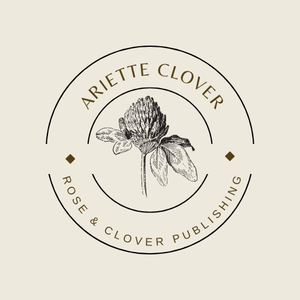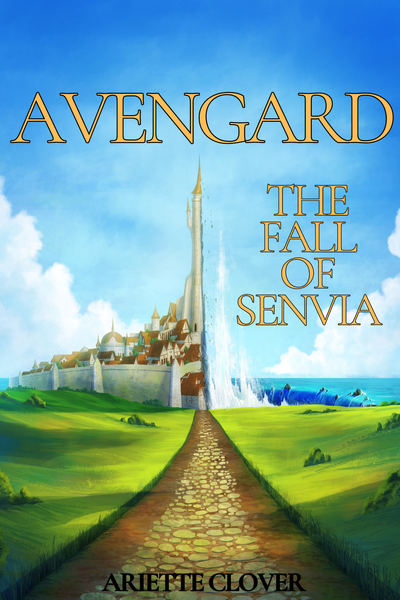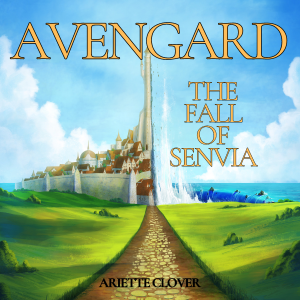It took me half an hour to clean up after the ambush. The wagon was mostly undamaged, barring a half dozen arrows that had found their way between the shallow grain of the oak. It was, however, drenched in red. I didn't bother wasting our supply of water to scrub. It would have been too much work. Instead, I borrowed Eskir's dagger — the one I had given him, that he'd failed to use in the attack — and shaved off the surface layer of the wood.
The wagon was old anyway, I reasoned, and had sat in the wagon shed outside the inn for a full winter. Lucian had oiled it well with boiled linseed oil, and applied several coats. I was attempting to shave off only the thinnest layer of wood. I could re-apply the oil, but it would take days of drying time to properly apply enough layers, and mineral oil wouldn't be sufficient.
My fingers were precise, and I braced my palm against the side of the wagon to maintain consistency. It was like shaving a man's beard. I'd only done it once, just before Alaric's coronation.
I told him then, I wasn't a barber, nor his valet. I was Emperor's Guard.
He said he wanted to look groomed, and he didn't trust his other servants. They were bound to die for him, but I was bound to kill for him, and as he put it, I was an expert with any blade on the battlefield. If the blade was so much smaller, it would be that much easier to wield with precision.
I had to hold back a laugh at his likening of a greatsword to a shaving razor, but I didn't. I would never be as good as someone with any manner of experience, but I had been given a command by the man about to become the Emperor of Senvia.
So I shut my mouth, gritted my teeth, and set the blade to his skin as steadily as I could muster. My senses sharpened, and I could hear and feel each nick of the sharpened edge slicing through his coarse, greying black hairs.
I didn't have to like it, I just had to do it.
A small cracking sound came from the grain of the wood in front of me — a small splinter. I frowned, readjusted my blade, and shaved the peeling splinter away.
"Who were they?" I asked Eskir as I worked.
There was a chance he'd know, as he was the one they had been trying to kill.
He didn't answer.
"Oh right," I said, "the voice thing."
"They deserve a proper burial," he said, staring down at one of the attackers. I hadn't cleaned up the bodies at all, only the damage to our wagon and the scattered arrows along the roadway. Bodies were common in Avengard, anywhere the Senvian Empire had tread. Nature had adapted to the excess volume of available carrion. All I had to do was pull them to the side of the road, and animals would take care of the rest.
He had taken a knee beside the corpse, his hand pressed into the dead man's armour.
"They tried to kill you," I remarked.
"Yes, they did. And they were my friends."
I coughed. "Excuse me?"
He nodded down at the corpse. "I spent ten years of my life growing up alongside this man. We were so young, so eager to see the world." He leaned in, as if the ambusher could hear him. "We shared our first drink when we were kids, brother," he whispered, barely audible. "I'm sure we'll we share our last in the days to come."
"They tried to kill you," I repeated.
He gave a half-hearted laugh. "I don't blame them for it. We are... ideologically opposed."
I wondered what their ideology was. Or what Eskir's was. The one he couldn't talk about. He wasn't satisfied with Senvia, that much was clear, but to what degree? "Ideology or not," I said, changing the subject, "you were useless today. I need you to take care of yourself."
"Do you mind if we pause here for a bit longer?" he asked, ignoring my comment. Without waiting for an answer, he stood up from his dead friend and walked out into the forest, his footsteps fading into the underbrush.
"I need you to learn how to fight!" I yelled after him.
I could have stopped him, or at least also shouted after him about the stupidity of walking out alone into the woods after a fairly large group had just tried to kill him. I hadn't caught any of the archers, either. They were still alive, just pulled back. Hopefully running as fast as their legs could take them. Hopefully not lying in wait, their cloaking spell reactivated. All I knew was, I couldn't hear them anymore.
I could have stopped him. But I didn't. I let him go, my eyes glaring into his back. I could have waited with the horses too, and stood at the ready in case he shouted out. Instead, I tied the horses, turned my back to him, and walked off in the opposite direction.
Something he had said still bothered me.
"Which one of us is the soldier?" I had asked.
His reply left too much unsaid. "Right now, here, today? Me."
He couldn't fight. He could barely hold a knife. There were calluses on the tips of his pollex, fore, middle, and ring fingers.
The ring finger was the strangest of them. For the rest, I would have guessed he was a writer with a three-fingered grip, possibly a scribe or researcher. Maybe he just had a strange grip. There weren't many other tasks that specifically excluded the little finger.
What if he played an instrument? Well, that was the optimist in me thinking. I loved musicians, especially the kind that didn't announce an oncoming battle. That was Lyana's influence, her passion for music. She couldn't play her worth to a coin, but she did frequently try to sneak past me to enjoy the live music in the red-light district. The greatest conglomeration of musicians in the capital rallied to streets covered by hanging red lanterns.
Despite its reputation, it was also a venue for food, festivals, and music. Better than that, it was filled with too many people not wanting to be seen. It made it easy for a hooded monarch, when she managed to actually sneak past me. When I realised and followed, I drew attention. But as long as that attention stayed on me, she was safe.
I missed that music.
But it was wishful thinking, that Eskir would be a musician. If he were, he would have carried an instrument. And he had come to the inn with suspiciously little, not even a rucksack of food. He didn't even have a water filter.
There was nothing wrong with being a writer, of course. Nothing officially wrong with being a writer. Writers were welcomed as speech-writers, educators, the keeping of archives through historical records and documentation, and authors. Most of all, and something nearly all of them shared, they were scholars, among the most influential members of society alongside Kindred, Deacons, merchants, artists, and sorcerers. Their word would reach where the voices of others would not.
And therein was the pessimist in me, that nagging doubt.
He said, "Right now, here, today? Me."
Even if I were going to believe that hands like that had been trained to hold a weapon, his performance in the ambush had taught me otherwise. The man was no soldier. Not with any conventional weapon.
And yet, he was calm. He might have been terrified during the ambush, but now he was collected. His mental recovery was staggeringly fast — faster than some Kindred, and Kindred were trained to be killers from birth.
There was nothing wrong with being a writer, as long as he was the right sort of writer. As long as he didn't touch any of the forbidden research of the world. I had a sick feeling in my gut that Eskir was exactly the sort of person who would dive into the kind of secrets that I didn't even know existed.
The wrong kind of scholar was the wrong kind of weapon to be carrying about in the world.
I thought on this for three hours as I brushed my way through the dense woodland. We weren't in Durn yet, but we were nearing Ghost Lake, which was infamously filled with the same sort of plantlife as the woodland country. The forest had already changed from the inn at the crossroads. There were fewer evergreens here, replaced by an abundance of willows and maples. When we reached Ghost Lake, those maples would vanish, and water-loving willows would take over. After that, it was the road's dip into Durn, and finally, on to Bell Haven, a city surrounded by dense, scratching shrubbery.
Eventually, I walked back to the wagon with a rabbit slung over my shoulder.
Eskir was sitting in the clearing with a collection of sticks, stones, and leaves surrounding him, a circle fancier than the one he'd managed before. More time had been spent on this collection. His knees sank into a soft bed of lush green moss, and pebble-sized stones came up to form a frame around the circle, sheltering him in his meditation. Underneath the whole thing, dead leaves added additional give to the soil. He'd set up off the cartway that formed the dirt path where the wagon travelled. His meditation was in the grass, the verge just before the forest, with several mounds of dirt before him where bodies had been lain to a shallow rest.
His meditation was the same ritual he had been doing before.
I let him be until my fire was made and the rabbit was cleaned and cooked. A cookway charm wove into the air a therapeutic rasp of wood scraping against wood as it turned the spit over the crackling flames for me. I reached over with a pinch of salt and a small vial of oil to season the rabbit.
It would have been lean. Wild animals were almost always lean. The oil helped the skin sear with a sizzle, and the spit was high enough that it wouldn't cook too quickly, even as the fat and oil dripped down into the flames, encouraging them to hungrily claw their way up the rabbit.
Eskir stood up and wandered over to the captivating smell of the meat.











Comments (0)
See all